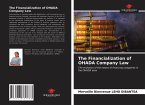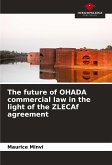This study is part of a new field of research, namely OHADA law. It addresses the delicate issue of de facto partnerships. The latter has been codified by the OHADA legislator, thus filling the legal vacuum that existed in several States parties to the treaty signed in Port-Louis and the gaps in the commercial code. The African Community legislator has highlighted in the OHADA law of commercial companies a plurality of definitions of the de facto company. It appears necessary to circumscribe the concept. This clarification involves determining the notion of a de facto company on the one hand, and on the other, determining the conditions of its existence. However, whatever the hypothesis adopted, there is a uniqueness in the legal regime of de facto partnerships. The usefulness of the partnership is manifested through the total commitment of the partners to their creditors and a concern to liquidate the partnership between them, deduced a posteriori.
Bitte wählen Sie Ihr Anliegen aus.
Rechnungen
Retourenschein anfordern
Bestellstatus
Storno








